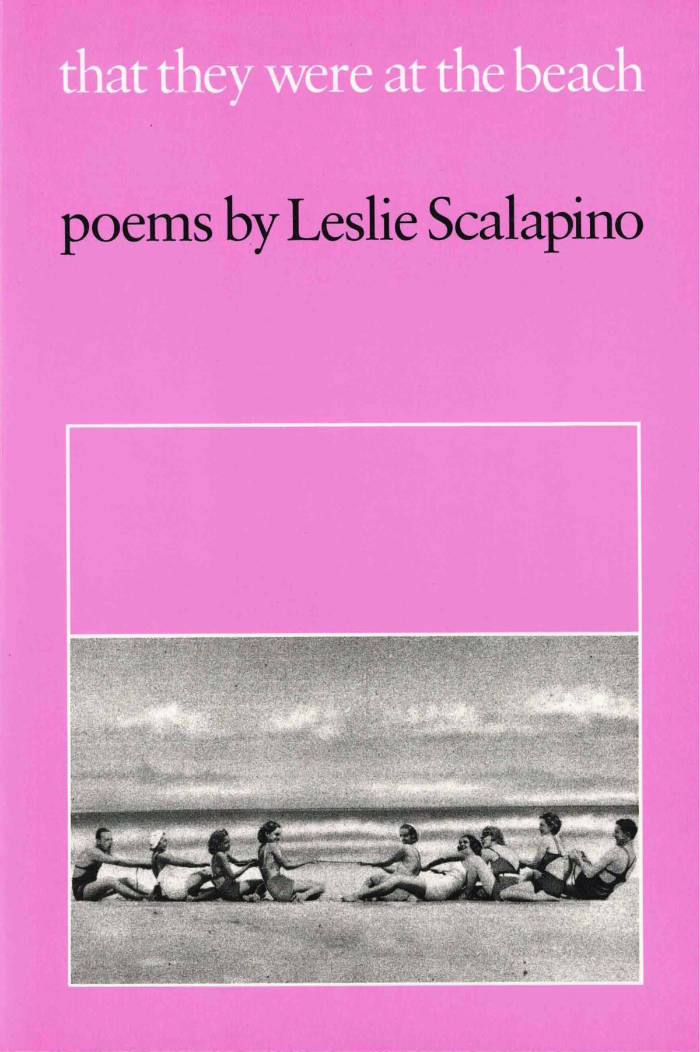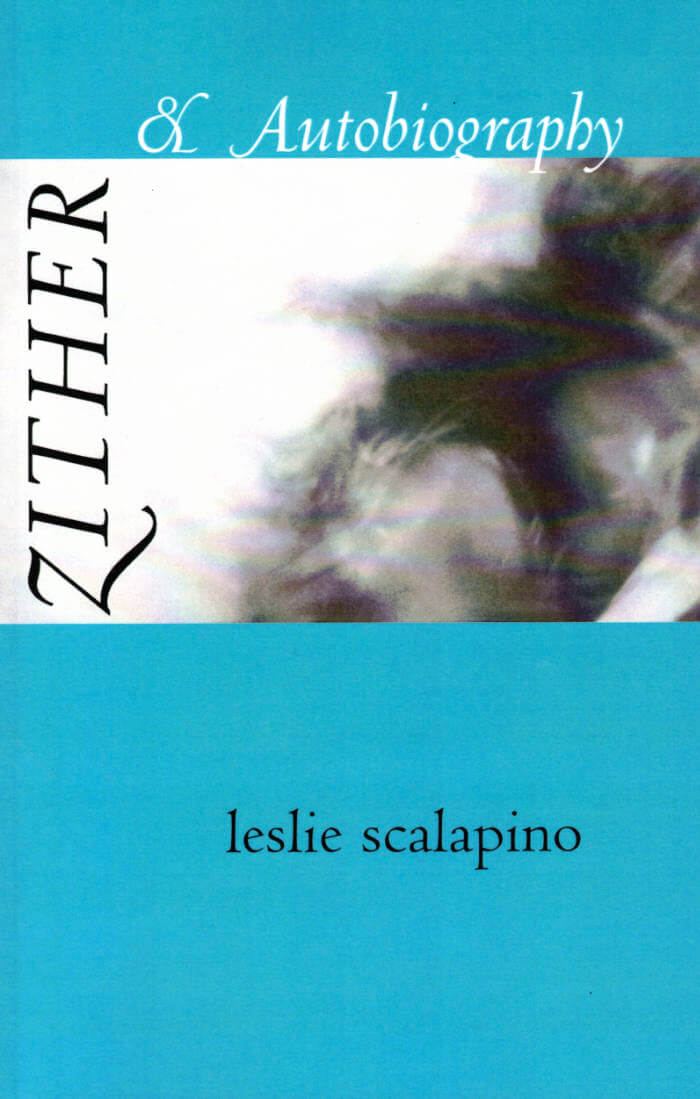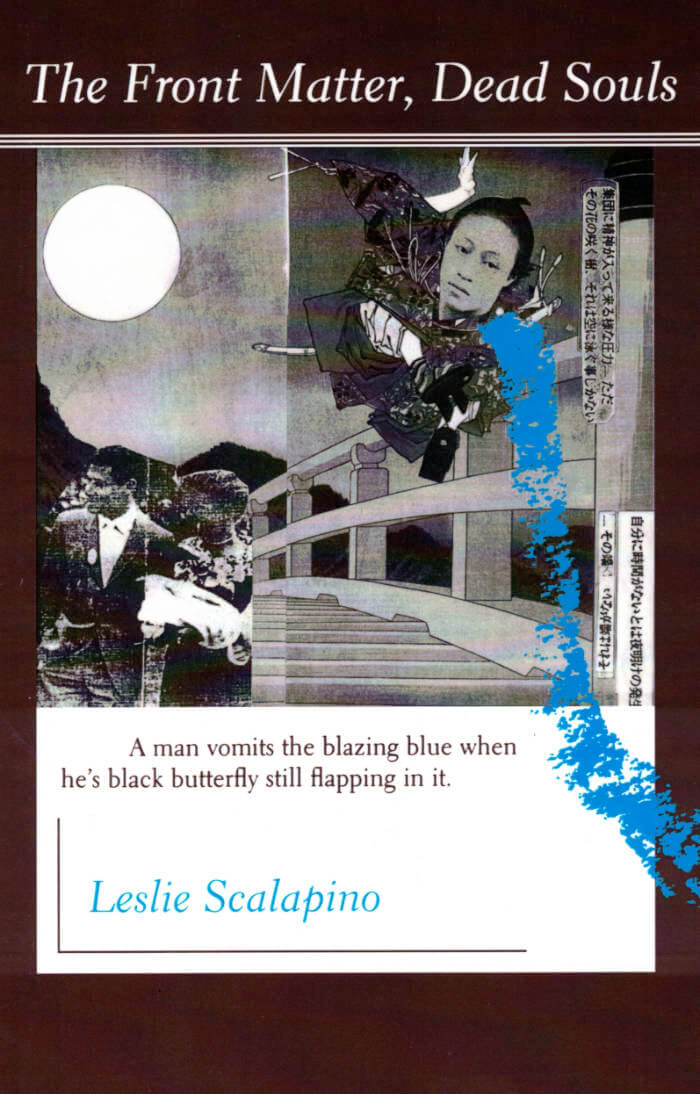Leslie Scalapino
Leslie Scalapino

Leslie Scalapino with Michael Cross – Interview & Essay
Leslie Scalapino, Michael Cross
Edited and introduced by Michael Cross, this book features an interview Cross conducted with Leslie Scalapino from 2007-2010, as well as Scalapino’s “Poetics” essay, both published here for the first time. 62 pages, side stapled. Cover art by Amy Evans McClure. Covers RISO printed by Aaron Cohick.
From Michael Cross’s introduction to this volume:
"I first worked up the courage to propose a long-form interview to Leslie Scalapino in September of 2006. By then, I had spent most of my early writing life obsessed with her project. Her work was the first to genuinely illustrate for me what poetry is and what it can ultimately do, and ever since that first glance into that they were at the beach—which I discovered by chance as an undergraduate—I spent much of my free time attempting to apprentice myself to her. As a graduate student at Mills College in the early aughts, I spent hours obsessively scanning the shelves of an all-but-forgotten warehouse in San Leandro called Gray Wolf Books, which I’d discovered was a treasure-trove of Bay Area Language writing, including shelves of abandoned and out-of-print O Books. I sent a letter to the publisher’s address on the back of those books, and incredibly, Scalapino herself answered with the generosity that defined her among younger poets."

That They Were at the Beach
For this collection of poems and prose, Leslie Scalapino has gathered four sequences into what she calls an “aeolotropic series.” The poems reflect each other like crystals and change like highly polished glass illuminated by a shifting light. They follow the mind from thought and observation to afterthought, reflection, and obsession.
Leslie Scalapino (1947-2010) is the author of thirty books of poetry, prose, inter-genre fiction, plays, and essays, including numerous collaborations with artists, writers, and dancers. Her long poem way (North Point Press, 1988) won the Poetry Center Award, the Lawrence Lipton Prize, and the American Book Award from the Before Columbus Foundation. Scalapino taught at the Naropa Institute, Bard College, Mills College, and UC San Diego. She was the editor and founder of O Books.

Zither & Autobiography
Zither & Autobiography is comprised of two parts: the author's autobiography and a book-length poem entitled Zither. Both parts of the book are concerned with facts and their undoing. In Autobiography, Scalapino explores her shifting memories of childhood—especially of years spent in Asia—experimenting with the memoir form to explore how a view of one's own life develops, how fixed memories move as illusion.
Zither opens with a unique narrative that the author describes as samurai film, and as Classic Comic of Shakespeare's King Lear (without using any of Shakespeare's language, characters or plot). Creating a complex spatial soundscape, the poem works formally to allow continual change of one's conceptions while reading. The juxtaposition of the two parts and the connection between them is the anarchist moment... disjunction itself, a key concept in much of Scalapino's work. This vivid book reveals in every thought-sparking section just why Scalapino has been hailed by Library Journal as one of the most unique and powerful writers at the forefront of American literature.

The Front Matter, Dead Souls
This extraordinary new book is essay-fiction-poetry, an experiment in form, a serial novel for publication in the newspaper that collapses the distinction between documentary and fiction.
Leslie Scalapino is widely regarded as one of the best avant-garde writers in America today. This extraordinary new book is essay-fiction-poetry, an experiment in form, a serial novel for publication in the newspaper that collapses the distinction between documentary and fiction. Loosely set in Los Angeles, the book scrutinizes our image-making, producing extreme and vivid images-hyena, Muscle Beach in Venice, the Supreme Court, subway rides-in order for them to be real. Countering contemporary trends toward interiority, Scalapino's work constitutes a unique effort to be objectively in the world. The writing is an action, a dynamic push to make intimacy in the public realm. She does not distinguish between poetry and real events: her writing is analogous to Buddhist notions of dreaming one is a butterfly, and becoming aware that actually being the butterfly is as real as dreaming it.

The Public World / Syntactically Impermanence
The Public World / Syntactically Impermanence is a rich consideration of the strategies of poetry, and the similarities between early Zen thought and some American avant-garde writings that counter the language of determinateness, or conventions of perception. The theme of the essays is poetic language which critiques itself, recognizing its own conceptual formations of private and social, the form or syntax of the language being syntactically impermanence.
Whether writing reflexively on her own poetry or looking closely at the writing of her peers, Leslie Scalapino makes us aware of the split between commentary (discourse and interpretation) and interior experience. The poetry in the collection is both commentary and interior experience at once. She argues that poetry is perhaps most deeply political when it is an expression that is not recognized or readily comprehensible as discourse.
And more

Death Styles
In this follow-up to her award-winning collection, Toxicon and Arachne, Joyelle McSweeney proposes a link between style and survival, even in the gravest of circumstances. Setting herself the task of writing a poem a day and accepting a single icon as her starting point, however unlikely—River Phoenix, Mary Magdalene, a backyard skunk—McSweeney follows each inspiration to the point of exhaustion and makes it through each difficult day. In frank, mesmeric lyrics, Death Styles navigates the opposing forces of survival and grief, finding a way to press against death’s interface, to step the wrong way out of the grave.
A recipient of a 2022 Guggenheim Fellowship for Poetry, Joyelle McSweeney’s published works span poetry, prose, drama, translation, and criticism. Her debut volume The Red Bird (2001) inaugurated the Fence Modern Poets Series; her verse play Dead Youth, or the Leaks (2012) inaugurated the Leslie Scalapino Prize for Innovative Women Playwrights; and her most recent double-collection, her co-translation with Jack Jung, Don Mee Choi, and Sawako Nakayasu of Yi Sang’s Selected Works received numerous recognitions, including the 2021 MLA Aldo and Jeanne Scaglione Prize for a Translation of Literary Work. Her influential volume The Necropastoral: Poetry, Media, Occults (2014) counters conventional ecopoetics by locating aesthetic and political possibility in such signature Anthropocene phenomena as mutation, contagion, contamination, and decay. McSweeney is a Professor of English at the University of Notre Dame.

A Community Writing Itself: Conversations with Vanguard Writers of the Bay Area
A Community Writing Itself features internationally respected writers Michael Palmer, Nathaniel Mackey, Leslie Scalapino, Brenda Hillman, Kathleen Fraser, Stephen Ratcliffe, Robert Glück, and Barbara Guest, and important younger writers Truong Tran, Camille Roy, Juliana Spahr, and Elizabeth Robinson. The book fills a major gap in contemporary poetics, focusing on one of the most vibrant experimental writing communities in the nation. The writers discuss vision and craft, war and peace, race and gender, individuality and collectivity, and the impact of the Bay Area on their work.
Sarah Rosenthal grew up in Chicago and lives in San Francisco. She is the author of three chapbooks: How I Wrote This Story (Margin to Margin, 2001), SITINGS (a+bend, 2000) and not-chicago (Melodeon Poetry Systems, 1998). Her poetry and fiction have appeared in numerous journals and have been anthologized in BAY POETICS (Faux Press, 2006) and hinge (Crack Press, 2002). She has taught creative writing at Santa Clara University and San Francisco State University. She has edited a collection of interviews entitled A Community Writing Itself: Conversations with Vanguard Writers of the Bay Area. She is the recipient of the Leo Litwak Award for Fiction and grant-supported writing residencies at the Vermont Studio Center and the Ragdale Foundation.

Pasts, Futures, and Aftermaths: Revisiting the Black Dada Reader
The sequel to Pendleton's acclaimed Black Dada Reader, compiling an anti-canon of radical experimentation and thought.
In 2011, artist Adam Pendleton (born 1984) assembled Black Dada Reader, a compendium of texts, documents and positions that elucidated a practice and ethos of Black Dada. Resembling a school course reader, the book was a spiral-bound series of photocopies and collages, originally intended only for personal reference, and eventually distributed informally to friends and colleagues. The contents - an unlikely mix of Hugo Ball, W.E.B. Du Bois, Adrian Piper, Gertrude Stein, Sun Ra, Stokely Carmichael, Gilles Deleuze -formed a kind of experimental canon, realized through what Pendleton calls radical juxtaposition. In 2017, Koenig Books published the Reader in a hardcover edition, with newly commissioned essays and additional writings by the artist. A decade later, Pendleton has composed another reader, building upon the constellation of writers, artists, filmmakers, philosophers and critics that emerged in the first volume.
Source texts by Sara Ahmed, Mikhail Bakhtin, Toni Cade Bambara, Amiri Baraka, Augusto de Campos, Hardoldo de Campos, and Décio Pignatari, Angela Davis, Gilles Deleuze, Julius Eastman, Adrienne Edwards, Clarice Lispector, Achille Mbembe, Philippe-Alain Michaud, Charles Mingus, Piet Mondrian, Leslie Scalapino, Leonard Schwartz and Michael Hardt, Juliana Spahr, Cecil Taylor and Malcolm X.